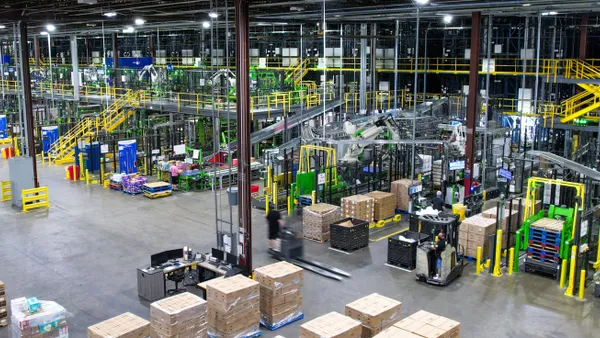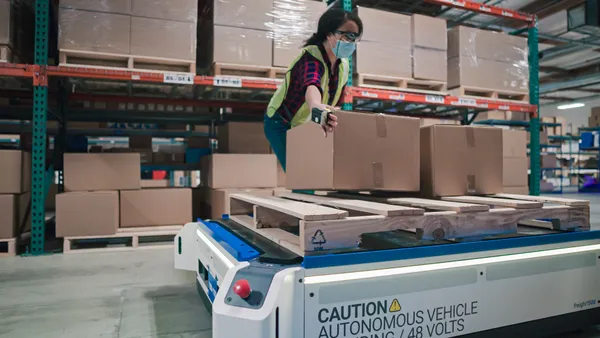Dive Brief:
- Diageo, the alcoholic beverage parent company of brands such as Bailey's, Guinness and Smirnoff, missed its goal of reducing packaging weight by 15% by 2020, whittling away just 11%. Diageo found the goal "more challenging than expected," it noted in a press release.
- It did beat its goal for the amount of recycled material included in its packaging (40% average recycled content in its plastic bottle by 2020) with nearly 46% of the materials coming from recycled input components, Diageo said in its 2020 sustainability report released this week. More than 85% of the company's packaging material was glass.
- The report showed the majority of the company's packaging is recycled or recovered in five countries, led by Germany (81%) and Ireland (75%). Diageo declined through a spokesperson to comment when asked to explain the variance among countries and other aspects of the report.

Dive Insight:
Glass presents a dilemma for companies using the material in their packaging. It's largely recyclable and can reduce landfill waste. Companies such as Unilever present it as a possible alternative to plastics. But glass is also a heavier material than most plastics, which can increase transportation costs and emissions through additional fuel usage.
Packaging manufacturers are working to develop materials that are recyclable and lightweight. Vetropack is developing lightweight glass, which the manufacturer says "saves raw materials, weight and transport costs."
For fast-moving consumer goods companies, changes to packaging, including weight reduction and the material used, have been relatively easy operational shifts, according to McKinsey. (Though, Diageo's missed weight goal suggests those "easy" changes might be harder than anticipated.) Tide pivoted to laundry detergent packaging that resembled boxed wine for lighter and more compact shipping.
The more challenging tasks are reducing waste and increasing recycling rates, McKinsey said.
"Successfully addressing the new recyclability and waste challenges is likely to stretch the capabilities of their current tools and strategies," McKinsey said. "Consequently, [CPGs] and retailers will require much closer collaboration with upstream players, packaging converters, and recyclers to successfully deal with these new challenges."
Diageo wrote that it plans to invest more in "circular economy opportunities" but did not expand further on details.
Making changes to packaging won't necessarily be cheap or easy. Nestlé announced plans earlier this year to pour more than $2 billion into sustainable packaging development.
Loop has teamed up with some brands to better implement circular ecosystems in which containers are reused. But this system requires a lot of team effort including the logistics company (UPS) that delivers and picks up totes, the waste management company (TerraCycle) that cleans the packaging, and the brands that develop and provide packaging that can be used multiple times in this environment.
Germany sits atop the list with Diageo's packaging recovery rate more than a year after the country passed packaging legislation. The goal of Germany's new Packaging Act (VerpackG) was to increase recycling and require distributing companies to contribute more to disposal costs.
"In particular, the use of one-way drinks packaging is to be significantly reduced by the new packaging law," Ionos, a Webhosting company that provides assistance to entrepreneurs, wrote in a blog post explaining the new law.

In the U.S., the recycling of packing has increased over the last decade, but 2017 saw the first uptick in packaging headed to the landfill since the turn of the century, according to numbers from the Environmental Protection Agency.
Some of the largest retailers in the U.S. have made commitments to reduce their plastic waste. And a 2018 survey of 358 packaging professionals found 69% of respondents feel a high level of concern — meaning they chose seven or higher on a scale of one to 10 — regarding environmental issues and plastic packaging, according to Packaging Digest and the Sustainable Packaging Coalition.
This story was first published in our weekly newsletter, Supply Chain Dive: Operations. Sign up here.














